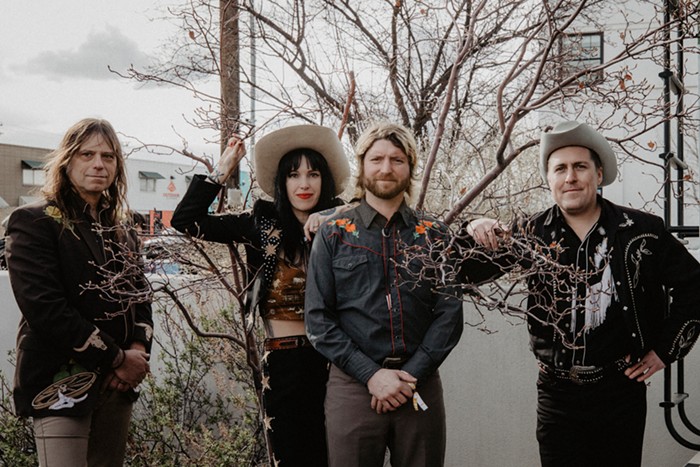TED LEO WILL NEVER make a bad record. Granted, one can't definitively predict a career path that might take an ill-advised detour into Tuvan throat singing or proselytizing Christian ska, but it's safe to assume that Leo, a linchpin of punk culture for two decades running, will stay upon the righteous path. Even if this route isn't always the path of least resistance.
"It's horrible. It's really, really, really disheartening," Leo says of being on the losing end of not just one collapse of an iconic record label, but two. After a trio of fine LPs on punk staple Lookout!, Leo jumped ship when the Berkeley label suddenly went under. No independent record label could have offered steadier footing than Touch and Go, who released his Living with the Living LP in 2007, and a benefit EP the following year. But that was short lived, as the Chicago label was unable to quell hemorrhaging losses from their distribution wing, and they ceased their record label operations (back catalog notwithstanding) in 2009.
"In terms of the failure of labels like Touch and Go and Lookout!, it's a real shame. There are a lot of fucking fuckers out there who run shitty labels who could be partially credited for driving music into the ground. And then there are people like Lookout! and Touch and Go who have basically tried to do everything right for as long as they could and for all of the right reasons. They wind up being the ones who get screwed. It's definitely disheartening."
You can take the boy out of Jersey (but not the Jersey out of the boy), and while Leo shares a tidy working-class, rock-and-roll urgency with Garden State elder statesman Bruce Springsteen, truth be told his roots are more aligned with the DIY foundation that was birthed in Washington DC under the Dischord banner. But even Leo—whose upstanding nature flirts with an Ian MacKaye-level of punk infallibility—can't exist solely off the grid, having to labor through problems at work (record label collapses) and at home (health care worries) just like the rest of us.
As for the latter, Leo was championing the merits of HR 3962 (that would be the now-mangled Affordable Health Care for America Act) long before it was cool for musicians to transfer the politics of song from the battlefield to the hospital bedside. Initially on his Treble in Trouble EP, and later with the excellent "Heart Problems" ("You got a problem with your heart/Follow the line down your left arm/If there's no money in the palm of your left hand/You could be pulled apart"), Leo addressed the thorny issue with a channeled rage and level of frustration shared by anyone caught in the merciless wheels of modern-day American health care. His partner's recent health troubles placed him squarely inside an issue he had been rallying against for years. "We found ourselves looking at the potential of being $100,000 in debt versus being healthy. It shouldn't be that way."
To hear anything even remotely negative from this eternal punk optimist (Joe Strummer comparisons are not uncommon, nor are they inaccurate) feels out of place. In addition to searching for yet another record label home (Matador Records won out in the end), Leo's longstanding fiery political idealism was running on fumes during the final years of the Bush Doctrine. Whether it was the music industry turmoil, or being known as a candid artist with a sleeveful of open emotions, Living with the Living found Leo restlessly toggling between power-pop love songs ("Who Do You Love?") and the fatigued acceptance of opposing a pair of neverending wars ("Bomb. Repeat. Bomb.").
Yet solo album number six, the just-released The Brutalist Bricks, is as jittery and impassioned as its predecessors—the massive "Bottled in Cork" could act as a primer for the man's entire solo career in one convenient song. The exigency of "The Mighty Sparrow" is bundled in Leo's frenzied nervousness, and the album's first single, "Even Heroes Have to Die," is yet another massive anthem, one that just might answer the query Leo previously posed in "Where Have All the Rude Boys Gone?" The Brutalist Bricks' frantic tempo is a relief to any skeptic who believed Leo might slow his pace as the years ticked by.
"There's no question there's a grinding aspect to this that gets harder to do as the years go on. Especially as you get to be my age," explains Leo, who turns 40 later this year. "Instead of being like, 'Holy shit, I'm in my late 30s? What am I doing here?'—sometimes you feel like that when you're huffing gear up 30 flights of stairs or caught in a traffic jam on the highway—the fact is you get to be onstage every night. For me it's hard not to look at it and say, 'Holy shit, I'm in my late 30s! Isn't this awesome that this is where I am right now?'"



















